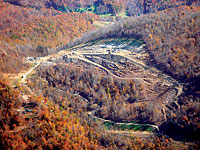A citizens’ guide to forests, subdivisions

Making the grade: Here, slope-side grading that will become an airstrip for private jets going to and from Wolf Ridge in Madison County. photo by Pete Orthman, courtesy SouthWings
|
The Mountain Voices Alliance, a coalition of citizen groups concerned about the environmental impacts of steep-slope development, hosted an educational forum Nov. 9 about public-policy tools that can be implemented to protect mountain landscapes.
Will McDow, a forestry specialist with the Raleigh office of national nonprofit Environmental Defense, presented an overview of a report he co-authored that deals with forest decline, land-tax policy and other issues. The report’s findings, based on state-government assessments, showed that one million acres of forest was lost in North Carolina between 1990 and 2002. “That’s an area the size of Buncombe County, Yancey County and Madison County combined,” McDow said. The report recommends policy changes that would make it easier for landholders to preserve their wooded lots, he said, since the majority of the state’s forests are privately owned. The state’s “present use value tax” program, which grants tax exemptions for landholders managing for commercial timber harvesting, could be expanded to include management for wildlife or species diversity, he suggested.
Another speaker at the forum was Gary Davis, an environmental attorney representing the Madison County citizen group Laurel Valley Watch. “We’ve been fighting hand-to-hand combat in Madison County, basically,” Davis joked, referring to a legal battle concerning a ridgeline-development project that would include some 900 housing units, a private airport and a wastewater sewage-treatment plant. He displayed an aerial photo of the slope-side grading across Haw Ridge for the jet strip, characterizing it as a “strip-mine development.”
Davis pointed to what he termed a lack of a comprehensive planning process on the county level. “The subdivision ordinances we have on the books are not doing the job,” he insisted. He went on to give examples of policy measures from other locales that he said resulted in more responsible planning.
A corridor goes against the crowd
With new residential and commercial-development projects on the horizon, the landscape surrounding the U.S. 70 corridor through Swannanoa and Black Mountain is starting to change.
A long-range transportation plan for that particular stretch is underway, though still in its earliest phases. Eventually, the study will look at a range of future growth scenarios, considering not just smooth traffic flow but the impacts of land use.
“From the town of Black Mountain’s point of view, we have a major interstate, a railroad line and U.S. 70 all running through the middle of our town,” says Elizabeth Teague, the town’s planning director. “It raises a variety of issues from safety, to visibility, to aesthetics. We’d like to redesign that area, make it safer, and create a gateway into downtown.” Multimodal transportation is also important, she says. “The town of Black Mountain in our comprehensive plan has stated that we want pedestrian, bicycle and transit access. We want that planned into the corridor design.”
The study is a combined effort of Black Mountain, the Metropolitan Planning Organization, North Carolina’s Department of Transportation and a hired consultant. Input from the general public will also enter the planning process, says Teague.
“We know there’s development that’s occurring in Swannanoa and Black Mountain — particularly residential — that just wasn’t happening before,” Teague commented. “As local leaders, our boards or committees have to decide, well, do we want to direct how this growth happens, or are we going to let it happen to us?”
To be added onto the stakeholders’ list for this transportation plan, members of the public can e-mail the consultant at ktilbury@citiesthatwork.com.



Before you comment
The comments section is here to provide a platform for civil dialogue on the issues we face together as a local community. Xpress is committed to offering this platform for all voices, but when the tone of the discussion gets nasty or strays off topic, we believe many people choose not to participate. Xpress editors are determined to moderate comments to ensure a constructive interchange is maintained. All comments judged not to be in keeping with the spirit of civil discourse will be removed and repeat violators will be banned. See here for our terms of service. Thank you for being part of this effort to promote respectful discussion.